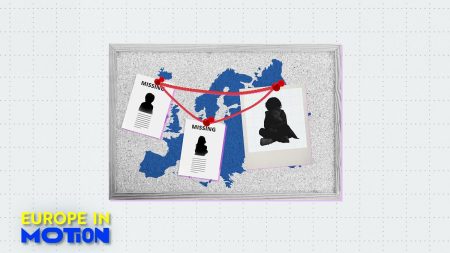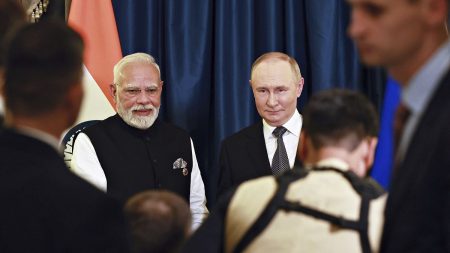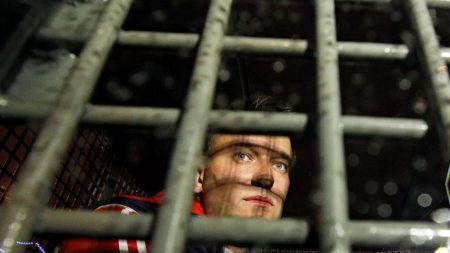Summarize this content to 2000 words in 6 paragraphs in Arabic
By Oleksandra Deineko, Guest Researcher, Norwegian Institute for Urban and Regional Research (NIBR), Oslo Metropolitan University, and Vilde Hernes, Researcher, Oslo Metropolitan University
The opinions expressed in this article are those of the author and do not represent in any way the editorial position of Euronews.
Ukraine’s general need to strengthen its army in the fight against Russia presents European governments with new dilemmas. How does one deal with a potentially growing population of Ukrainians who may be unable to renew their documents, Oleksandra Deineko and Vilde Hernes write.
ADVERTISEMENTIs Europe about to have a massive number of new undocumented refugees on their hands?On 18 May, a new Ukrainian Mobilisation Act entered into force, altering regulations for the Ukrainian mobilisation processes, military service, and military registration to reinforce the Ukrainian army and ensure the continued defence of Ukraine against the ongoing Russian aggression.The new Mobilisation Act has caused heated political debate in Ukraine but is not merely a domestic concern. Its ripple effects will confront both the millions of Ukrainians living abroad and European governments with tough dilemmas. So, what does this new act imply for the millions of Ukrainians who have fled abroad – and for the European governments hosting them?The main implications of the new Mobilisation Act for Ukrainians — affecting those living in Ukraine and abroad alike — are related to amendments concerning who is included and exempted from registration, mobilisation, and military training and the consequences of non-compliance. First, the new legislation lowers the age limit of who may be mobilised from 27 to 25. It also introduces mandatory basic military service for persons aged 18-25.A more technical — but potentially highly influential — change is that the category “limited suitability for military service” has been removed, which previously meant that you would be exempt from being sent to the frontlines. This change implies that most persons who had previously been deemed to have “limited suitability” — meaning, now must undergo a re-examination within nine months.Medical examination, a catch-22Second, one of the main new obligations in the new act is that Ukrainian men (and women with medical or pharmaceutical education) between 18 and 60 must update their data in the military register within 60 days. Updating data in the military register does not automatically imply being summoned to military service, but it may be an important precondition for later mobilisation.At first glance, this data update requirement may seem purely technical, but it has many implications for Ukrainians abroad.Firstly, although the legislation allows updating this data electronically from abroad, the new regulations also require a medical re-examination to fulfil the requirements. As a medical examination cannot be conducted electronically, Ukrainians living abroad could subsequently be required to undergo a new medical examination in person, potentially having to return to Ukraine to fulfil the obligation.Secondly, although the new Mobilisation Act does not explicitly address this question, the updated information may allow for sending summons electronically in the future. This raises the question: What are the consequences for Ukrainian men abroad — and the European countries hosting them — if they do not update their data in the military register?No coercion, yet questions remainFor all Ukrainians, failure to comply with the new requirements can result in a fine, with severely increased penalty rates. If the fine is not paid, an arrest may be placed on property and assets. They may also be banned from driving vehicles. An additional consequence for Ukrainians residing abroad is that they will lose access to consular services from Ukrainian institutions in foreign countries if they don’t update their data in the military register. One important implication of this restriction is that they will not be able to get passports issued or renewed. This latter point may cause challenges with identity checks and mobility, for example, if they need to cross European borders or wish to cross the Ukrainian border to visit their home country. It will lead to both legal and social isolation from their native country.ADVERTISEMENTThus, Ukrainian men staying abroad face a significant dilemma: comply with the new requirements set out in the new act or ignore them? Updating their information in the military register introduces uncertainties about potential mobilisation while avoiding the new requirements, which could result in losing their passport and severing connections with Ukrainian authorities and society. Even though the current law does not include the possibility of digital summons, there are indications that the Ukrainian state will significantly intensify army recruitment in the near future. However, representatives of the Ukrainian government have stated that Ukraine will not forcibly return conscripted men from abroad. Ukrainian lawyers also conclude that there are currently no coercive mechanisms for returning conscripts to Ukraine.Ukraine’s general need to strengthen its army in the fight against Russia presents European governments with new dilemmas. ADVERTISEMENTHow does one deal with a potentially growing population of Ukrainians who may be unable to renew their documents (e.g. passports)? Most importantly, how does one weigh up the dilemma of helping Ukraine defend itself by aiding in the (voluntary or forced) return of citizens in the target group for mandatory mobilisation against ensuring human rights by providing protection for those fleeing from war?European governments’ responses to vary greatly?Although European countries have responded to the reception of Ukrainian refugees in a more unified manner when compared to previous influxes of asylum seekers, there are still striking differences in their overall reception and Ukrainians’ rights in the host countries. European governments have also sent diverging signals on how they will react to the implications of the new Mobilisation Act. For example, Polish officials have indicated that they may decide to stop issuing residence permits for Ukrainian conscripted men if the Ukrainian government requests it. The German government, however, has already assured Ukrainians of the possibility of obtaining a German travel document that can replace their passport. ADVERTISEMENTWhether European governments will tackle these questions nationally or at the EU level is currently unknown, but the initial signals from European governments indicate that their responses may differ greatly. Irrespectively, European governments will most likely have to deal with a growing population of Ukrainian refugees without valid identity documents. The fear of being sent back to Ukraine to serve on the frontlines may also increase the risk of a higher number of non-registered Ukrainians in European countries, potentially creating a large, new group of undocumented migrants in European communities. Is Europe prepared for that?Oleksandra Deineko is Guest Researcher at the Norwegian Institute for Urban and Regional Research (NIBR) and the Oslo Metropolitan University (OsloMet) and Associate Professor at the School of Sociology of the VN Karazin National University in Kharkiv. Vilde Hernes is Researcher at the Oslo Metropolitan University.At Euronews, we believe all views matter. Contact us at [email protected] to send pitches or submissions and be part of the conversation.ADVERTISEMENT
















